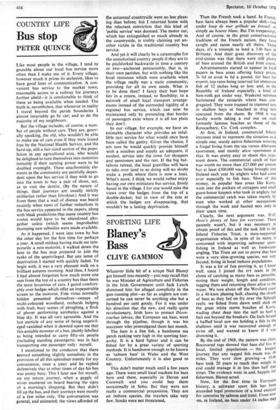COUNTRY LIFE
Bus stop
PETER QUINCE
Like most people in the village, I tend to grumble about our local bus service more often than I make use of it. Every village, however much it prizes its seclusion, likes to have good lines of communication. A con- venient bus service to the market town, reasonable access to a railway for journeys further afield—it is comfortable to think of these as being available when needed. The truth is, nevertheless, that whenever in reality I travel beyond the parish boundaries I almost invariably go by car, and so do the majority of my neighbours.
But the village includes, of course, a num- ber of people without cars. They are, gener- ally speaking, the old, who wouldn't be able to make use of cars even if they were issued free by the National Health Service, and the hard-up, still a fair-sized section of the popu- lation in any agricultural area, who would be delighted to turn themselves into motorists instantly if their earning power were to be doubled overnight. These anachronistic ele- ments in the community are painfully depen- dent upon the bus service if they wish to go into the town to buy a pair of shoes, say, or to visit the dentist.. (By the nature of things, their journeys are usually strictly utilitarian rather than frivolous.) And it was from them that a wail of dismay was heard recently when news of further reductions in the bus service appeared in the papers, along with bleak predictions that many country bus routes would have to be abandoned alto- gether unless (which seems improbable) thumping new subsidies were made available.
As it happened, I went into town by bus the other day for the first time for perhaps a year. A small mishap having made me tem- porarily a non-motorist, I walked down the lane to the bus stop prepared to join the ranks of the unprivileged. But any sense of deprivation I started with quickly faded. To begin with, it was a very pleasant walk on a brilliant autumn morning. And then, I found I had almost forgotten how much more one sees from the top of a country bus than from the most luxurious of cars. I gazed comfort- ably over hedges which offer an impenetrable screen to the motorist. Fine vistas normally hidden presented themselves—sweeps of multi-coloured woodland, orchards bulging with fruit, busy scenes of ploughing, a flock of plover performing aerobatics against a blue sky. It was all very agreeable. And the last particle of any sense of being unprivil- eged vanished when it dawned upon me that this amiable monster of a bus, plainly labelled as being intended to carry fifty-six people (including standing passengers), was in fact transporting one passenger only: myself.
I mentioned to the conductor that there seemed something slightly unrealistic in the provision of all this splendour merely for my convenience, once a year, and he replied defensively that at other times of day his bus was pretty busy. This I later saw for myself, on my return journey, when a gaggle of wives mustered on board bearing the signs of a morning's shopping. But they didn't fill up the bus, and their journeys were mostly of a few miles only. The conversation was general, and animated; the views afforded of
the autumnal countryside were no less. pleas- ing than before; but I returned home with the reluctant oonviction that this kind of 'public service' was doomed. The motor car, which has extinguished so much already in. the countryside, is visibly claiming yet an- other victim in the traditional country bus service.
And yet it will clearly be a catastrophe for the unmotorised country people if they are to be pitchforked backwards in time a century or two—anchored permanently, that is, in their own parishes, but with nothing like the local resources which were available when the village really was a static community, providing for all its own needs. What is to be done then? I fancy their best hope lies in a return, instead, to flexibility; to a network of small local transport arrange- ments instead of the outmoded rigidity of a regional bus service, which can now be maintained only by pretending that hordes of passengers exist where it is all too plain they don't.
In our village, for example, we have an estimable character who prOvides an infal- lible taxi service for what would once have been called the gentry. Given the chance, I am sure he would quickly provide himself with a minibus and supply an adequate, if mildest, service into the town for shoppers and pensioners and the rest. If the big bat- talions retreat, the local guerrillas will have to take over (and in so doing will no doubt make a profit where there is now a loss). What's more, I think we would rather enjoy having our own miniature bus service, firmly based in the village. I for one would miss the views over the hedges from the top of a double-decker; but in view of the rate at which the hedges are disappearing, that wouldn't be a lasting deprivation.






































 Previous page
Previous page